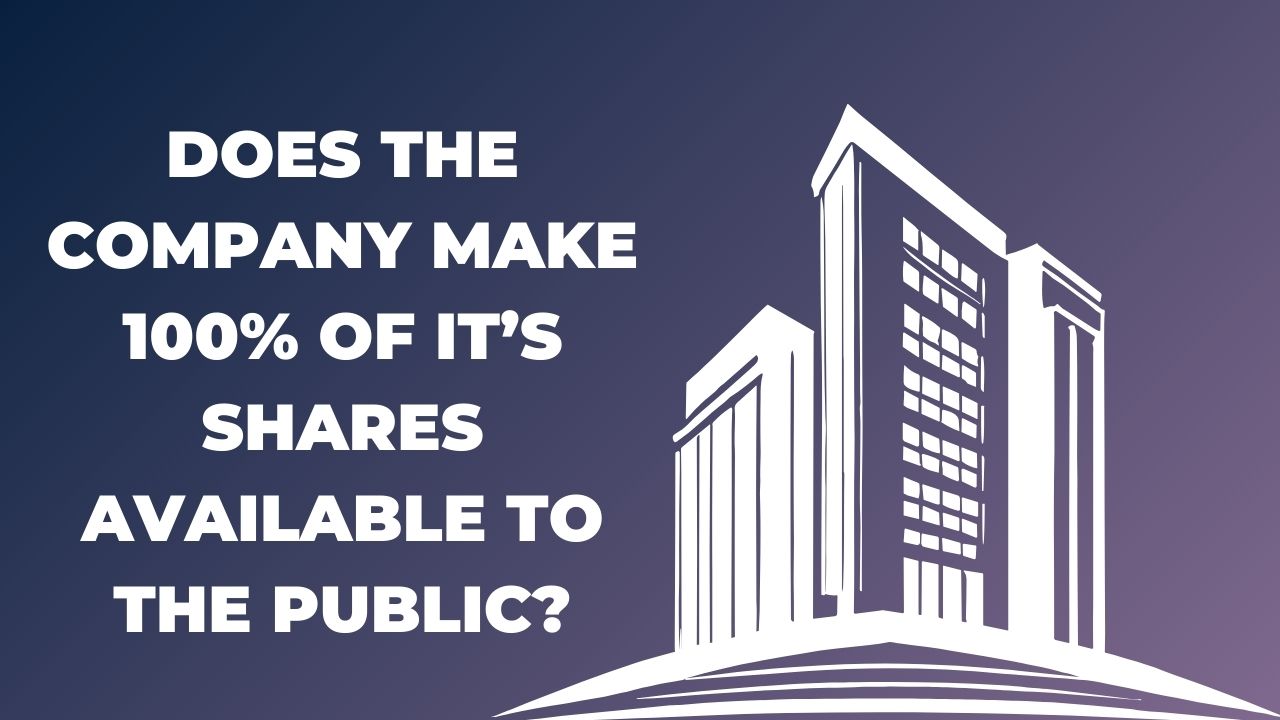You may have come across this question at any point of your life that how much a company offer its ownership to the public. Does the company make 100% of its shares available to the public? You are going to find answers to all such questions in this article to avoid further confusion. So let us begin.
Table of Contents
What does going public mean?
To raise capital for growth, research, or other projects, a company may decide to go public. This means it offers shares to the public, essentially saying, ‘Give us money and become part owners of our company.’ This process is known as an ‘initial public offering’ (IPO) or ‘going public.’ After going public, the company lists its shares on the stock exchange, where trading occurs in two markets. – the primary market and the secondary market. This allows investors to buy and sell shares of the company.
But did you know that not all shares are available to everyone? Some shares are kept within the company, while others are offered to the public.
How much of a company goes public?
The amount of a company that ‘goes public’ refers to the portion of its ownership made available to the general public for purchase through the sale of shares.

- When a company goes public, it does not mean that 100% of its ownership is placed on the public market. It typically offers a percentage of its shares to the public through an initial public offering (IPO). The exact percentage of the company that goes public can vary depending on several factors, including the company’s size, financial health, and strategic goals. In most cases, it’s usually less than 50%. Some companies may choose to offer a relatively small percentage of their shares to the public, while others may opt to offer a larger percentage. The decision often involves balancing the need for capital with the desire to retain control and ownership of the company.
Can a company go 100% public?
Yes, technically a company could offer all its shares to the public, but that almost never happens. Companies will never want to give total control to the public. If somehow it ever happens then no investor will come forward because there will be loss of control and there will be many conflicts between shareholders. Companies just sell some of its shares to the public to get money.
Can you own 100% shares of a company?
Yes, a single person can own 100% of the shares. There could be a case like you have started the company and you are the sole owner of the company. So you have the full control over the company and will be having 100% of its shares.
Another case will be like, if you want to own 100% of the shares of publicly traded company then answer is again yes. But you can not do that in open market like share market. You have to place a takeover offer to the board of the directors and get it approved by the shareholders. This process is known as ‘private buyout’ or ‘acquisition’. Although, this itself is not an easy task. In open market, you are not going to find 100% of the companies shares. Companies do not offer complete ownership to the public.
What can a 51% shareholder do?
A 51% shareholder is like the boss of a company. They have a lot of power because they own more than half of the company’s shares. This means they get to choose who runs the company by picking the board of directors. They also get to say “yes” or “no” to big decisions, like if the company should merge with another or make a big investment. Their vote is the most important, so what they say usually goes. Plus, they often get more money when the company pays out dividends. In simple terms, being a 51% shareholder means you’re in charge and can make big decisions that affect the company.
Can a 50% shareholder remove a director?
Removing a director requires a majority vote of shareholders, which typically means more than 50%. However, some companies may have specific provisions in their bylaws that allow for the removal of directors with a 50% shareholder vote. so it is important to review the company’s governing documents.
What is the 25% public shareholding rule?
There are rules and regulations regarding the minimum amount of shares that must be held by the public. For example, there is the 25% public shareholding (MPS) rule, which requires that at least 25% of the company’s free float shares be held by the public. This is known as Minimum Public Shareholding (MPS) rule.
What is the 75% shareholding rule?
When promotors of Indian companies listed on the stock exchange (excluding PSU companies) hold more than 75% of the free float shares, they’re required to sell some of their extra shares to reduce their ownership to a maximum of 75%. This reduction in ownership can be achieved by either selling shares to institutional investors or by offering rights shares to existing shareholders, thereby decreasing their ownership percentage.
Conclusion
In conclusion, it’s not common for most companies to have 51% of their equity traded in the open market. Only a small percentage of a company’s shares typically float in the market, limiting the availability of shares for public trading.

